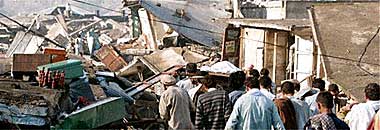18,000 died in Asian quake, says Pakistan

At least 18,000 people were reported to have died, and tens of thousands were injured, when a powerful 7.6-magnitude earthquake struck northern Pakistan and India yesterday. Among the dead were at least 400 schoolchildren, the bodies of 350 of whom, all girls, were pulled from the wreckage of a single school.
Entire villages appear to have been wiped from the map, and thousands of homes destroyed in a tremor so strong that buildings were rattled and swayed in the capitals of four countries, including Afghanistan and Bangladesh.
With communications cut over many of the areas involved, and roads blocked by landslides, there were fears that under the rubble of thousands of flattened homes could lie untold numbers of dead.
Today, Maj. Gen. Shaukat Sultan of the Pakistan army said that more than 18,020 people died — 17,155 of them in Pakistani Kashmir where the quake was centered. Authorities in India reported 360 deaths and 850 people injured.
It was at 8.50am local time, 4.50am London time, that the quake struck six miles underground at a point some 50 miles north of Islamabad, in the forest-clad mountains of Kashmir. It was followed over the next nine hours by 11 further tremors with magnitudes of 5.4 to 6.3, which shook buildings in Kabul, Dhaka and Delhi. The latter is more than 500 miles from the epicentre.
But the most sickening damage was wreaked close to the heart of the quake.In a school in Mansehra district more than 350 children were killed when buildings collapsed; 50 died at another school. In one district of Pakistan's North-west Frontier Province alone, more than 500 people were reported killed, and some villages all but obliterated.
Muzaffarabad, the capital of Pakistani-controlled Kashmir, was especially badly hit, and cut off by landslides from the rest of the country. There were reports of two schools, a hospital, and as yet countless homes reduced to rubble. One eyewitness said that "the whole city has been flattened".
In Islamabad, scores of people were feared killed or trapped in two 12-storey apartment blocks. Residents struggled to shift heavy concrete with bare hands. A resident of one block, Sabahat Ahmed, said: "By the time the second tremor hit, the building had already started to collapse ... I heard and saw people in a state of panic, and many were stuck under the building."
On the Indian side of Kashmir, police said the earthquake had killed 213 people and injured hundreds more. Half the deaths were in Uri, the last town on a highway connecting the two sides of the violence-scarred region. The dead included 15 soldiers, some in bunkers by the ceasefire line between India and Pakistan.
Pledges of international support arrived within hours, but details of the devastation were difficult to obtain. Telephone lines were down, mobile networks overwhelmed and relief efforts hampered by landslides and heavy rain.
Join our commenting forum
Join thought-provoking conversations, follow other Independent readers and see their replies
Comments
Bookmark popover
Removed from bookmarks